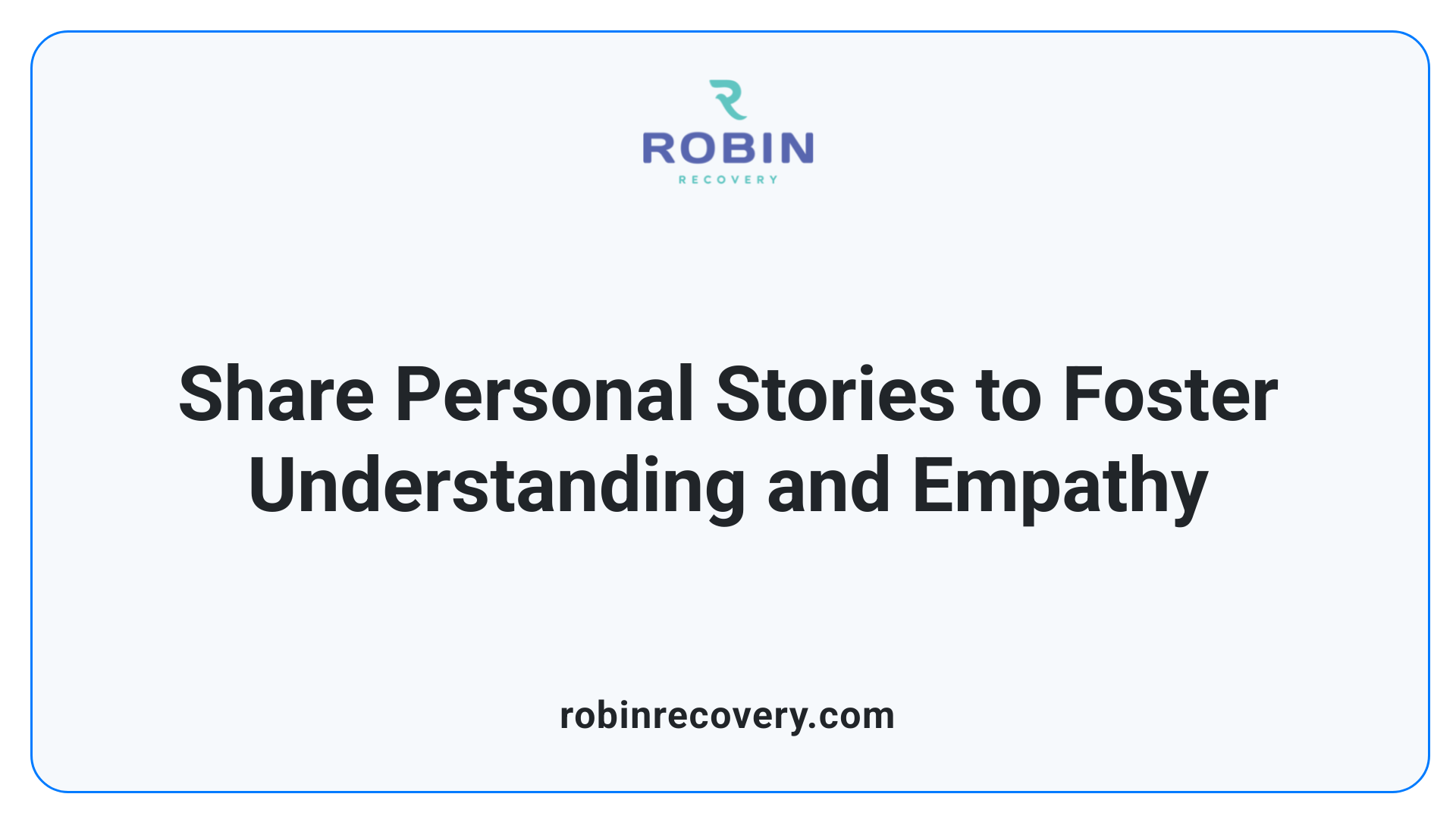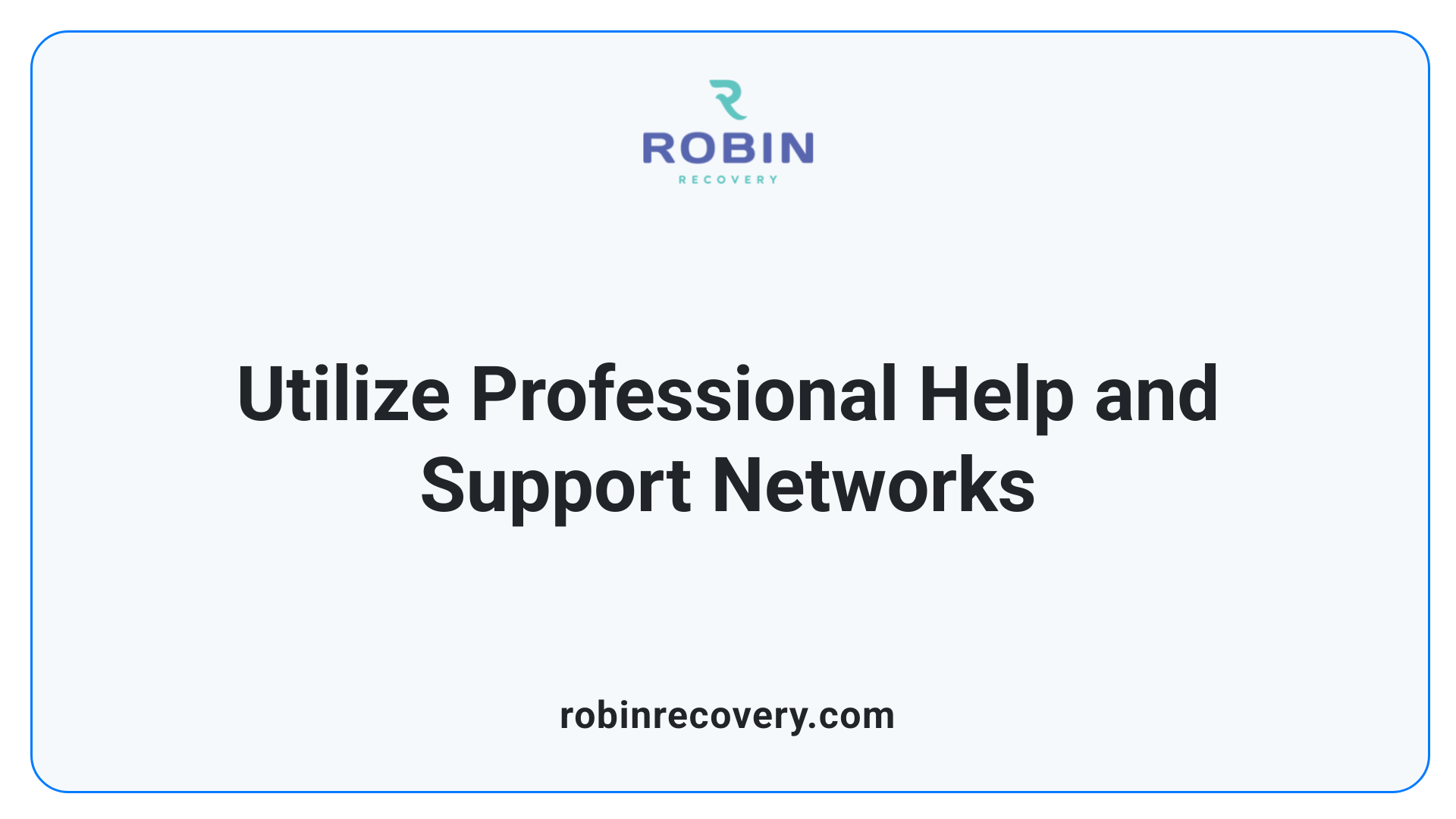Talking to Your Family About Your Addiction

Understanding the Importance of Communication About Addiction
Discussing addiction with family members can be daunting, yet it is a crucial step toward recovery and familial healing. Honest, compassionate conversations help demystify addiction, reduce stigma, and foster a supportive environment. This article explores effective strategies for talking about addiction, understanding family emotional challenges, and utilizing resources to support loved ones effectively.
Establishing a Foundation for Open Communication

Talking about addiction with family members can feel intimidating, but establishing a supportive, honest dialogue is vital for recovery and understanding. The first step is choosing the right moment—opting for a private, calm setting where everyone feels safe and unhurried. This environment helps facilitate open, less emotional conversations and reduces distractions.
Preparation is essential. Organize your thoughts beforehand by writing down what you want to say and practicing your responses. This can help you communicate more clearly and confidently, making it easier to express your feelings and concerns. Focus on specific behaviors or changes you’ve observed, rather than character judgments, to keep the conversation respectful and constructive.
Timing also matters. Ensure both you and your family members are in a relaxed mood and free from stress or other responsibilities. Starting the conversation when everyone is sober and receptive can significantly improve the chances of a positive dialogue.
When telling your family about addiction, honesty and openness are crucial. Share how you've been feeling and what you’ve been experiencing. Explaining that addiction is a chronic brain disease—something that influences behaviors but isn’t a moral failing—helps foster understanding.
Using person-first language, focusing on health and recovery, and providing supporting resources such as information about treatment options, can encourage your family to see addiction as a treatable condition. Remember, professional support lines like SAMHSA’s National Helpline are also available to guide you through this process and connect you with local services.
Overall, effective communication involves not only sharing but also listening with patience and empathy. Approaching your family with openness and preparation sets the stage for ongoing, supportive conversations that can be pivotal in the journey toward recovery.
Understanding Addiction as a Brain Disease
Addiction is a complex condition that involves biological, psychological, and social factors. Recognizing these components helps in understanding why addiction is more than just a lack of willpower; it is a chronic brain disorder that affects a person’s thoughts, feelings, and behaviors.
Biologically, addiction alters brain chemistry and circuits, making it difficult for individuals to control their cravings and resist substance use. Psychologically, factors like stress, trauma, or mental health issues can contribute to the development and persistence of addiction. Social influences such as peer pressure, family environment, and community resources also play a vital role.
Understanding addiction as a long-term condition emphasizes that it is not a moral weakness but a medical issue requiring treatment. It involves ongoing management, similar to other chronic diseases like diabetes or heart disease.
Addiction’s core characteristics are often summarized by the "Four C’s": compulsion, control, craving, and consequences. The compulsive aspect refers to an irresistible urge to use substances despite negative outcomes. Loss of control means individuals find it hard to resist or stop using. Craving describes the intense desire triggered by cues or situations, and the consequences are the adverse effects on health, relationships, and legal matters.
Effective treatment combines medical approaches, such as medication-assisted therapy, with psychological interventions like counseling and behavioral therapy. Family support and ongoing education about the nature of addiction are essential for sustained recovery.
For families and loved ones, understanding that addiction is a chronic brain disease can foster empathy and patience. It encourages a supportive environment where recovery is viewed as a process with possible setbacks, requiring continuous effort and understanding.
By learning about the core features of addiction and the biological basis behind it, families can better support their loved ones and help them access appropriate treatment. This approach moves away from stigma and promotes a compassionate, evidence-based response to addiction.
Recognizing Emotional Challenges in Families

Living with a family member who has an addiction can take a heavy emotional toll. Families often face intense feelings of trauma, anxiety, and depression. Witnessing crises such as overdoses, aggressive behavior, or relentless instability can trigger deep psychological wounds. These constant stressors may lead to conditions like post-traumatic stress disorder (PTSD), complicating the mental health landscape for loved ones.
The emotional strain can strain relationships within the family, foster feelings of loneliness, and contribute to ongoing mental health issues. It’s common for family members to experience helplessness, frustration, and guilt, which can hinder their ability to cope and support the addicted loved one.
Support structures are crucial in these situations. Therapy sessions, support groups like Al-Anon or NAMI, and community resources can provide a safe space for individuals to express their feelings and learn coping strategies. Sharing experiences with others facing similar challenges can validate emotions and reduce feelings of isolation.
Recognizing these emotional challenges and seeking help early is vital. Accessing mental health services and community support can foster resilience and help families rebuild stability and emotional well-being amidst ongoing struggles.
Effective Strategies for Initiating Conversations

How can I help my family understand addiction?
Helping your family grasp the realities of addiction begins with clear, compassionate communication. Start by emphasizing that addiction is a chronic brain disease, not a moral weakness or character flaw. Explain that it involves changes in brain chemistry and affects individuals regardless of background or character.
Providing factual information about substance use disorders and available treatments can dispel myths and reduce stigma. Sharing educational resources from trusted organizations like SAMHSA or the National Institute on Drug Abuse can be very helpful.
Encourage ongoing dialogue by fostering a supportive environment where questions are welcomed and discussed openly. Participating in family support services, such as family therapy or local support groups like Al-Anon, can promote collective understanding and healing.
Involving peer support specialists or family navigators, who often have lived experience with addiction, can help families connect on a deeper level and understand different perspectives. These professionals can guide families through emotional responses and help them develop effective coping strategies.
It’s important to cultivate a non-judgmental attitude, emphasizing patience and continuous learning. Reinforce that recovery is a journey, often involving setbacks, and that ongoing support, education, and empathy are essential. By prioritizing compassionate, informed conversations, you can create a foundation of trust and understanding that supports your loved one’s path to recovery.
The Role of Personal Narratives and Education

How do you tell your family about addiction?
Sharing your experience with addiction requires honesty, patience, and careful planning. Begin by choosing a calm, private setting where you feel safe. Organize your thoughts beforehand—consider writing down what you want to say to ensure clarity.
Start the conversation by expressing your feelings and explaining how addiction has affected your life. Use clear, straightforward language and focus on specific behaviors and their impacts rather than labels or blame. For example, you might say, "I've been struggling with substance use, and it’s affected my health, emotions, and relationships."
It’s helpful to emphasize that addiction is a chronic brain disease that requires treatment. Reassure your family that seeking help is a sign of strength, not weakness. Providing informational resources, such as pamphlets from SAMHSA or the National Institute on Drug Abuse, can help them understand the nature of addiction better.
Be prepared for emotional reactions, and give your loved ones time to process the information. Encourage questions and express your willingness to work through recovery together. Remember, professional support from counselors or family therapists can also facilitate ongoing, constructive dialogue.
Sharing recovery stories
Personal stories of overcoming addiction are powerful tools for education and stigma reduction. When individuals share their journey, it demystifies addiction and presents it as a medical condition that can be managed successfully. These stories promote empathy, encourage others to seek help, and foster hope.
Public testimonials, whether through support groups or online platforms, highlight that recovery is possible with treatment and support. They also help challenge stereotypes and misconceptions, showing addiction as a treatable health issue rather than a character flaw.
Dispelling stigma with facts
Education is crucial in fighting stigma associated with addiction. Understanding that addiction affects the brain and is influenced by genetics, environment, and life experiences shifts the perception from moral failure to medical illness.
Sharing evidence-based facts—such as relapse rates, the importance of treatment, and the effectiveness of programs like medication-assisted therapy—can demystify addiction. Using supportive, person-first language like “individual with a substance use disorder” instead of stigmatizing terms fosters respect.
Providing informational resources
Equipping families with reliable resources empowers them to support loved ones effectively. Websites such as SAMHSA, NIDA, and other reputable organizations offer valuable guides, treatment locators, and educational materials.
Offering family-focused support services and therapy can improve communication and address underlying issues. Regularly sharing these resources encourages ongoing learning and demonstrates that help is available.
Strategy Description Purpose Personal Stories Sharing successes and challenges Promote empathy and understanding Education and Facts Dispel myths, provide data Reduce stigma and inform Resources Access to support organizations Empower families and individuals
Understanding that recovery involves continuous effort and support helps in fostering a compassionate and informed environment. By openly sharing stories, educating loved ones, and providing reliable information, you create a foundation for healing and hope in the face of addiction.
Navigating Resistance and Maintaining Boundaries
What are the emotional challenges faced by families living with an addict?
Families living with an addict often endure intense emotional difficulties. They may experience trauma, anxiety, and depression due to constant stress and unpredictable circumstances. Witnessing overdoses, violent episodes, or ongoing chaos can lead to deep psychological scars, including symptoms of PTSD or complex PTSD.
These emotional strains can also contribute to relationship strain, feelings of loneliness, and difficulty managing daily life. It’s common to feel helpless or overwhelmed by the situation. To cope effectively, many families turn to therapy, peer support groups, and community resources. Accessing mental health support and joining support networks are vital steps in helping families process their emotions and build resilience.
Setting personal boundaries within the family can also protect mental health, helping members avoid burnout and maintaining their well-being. Ultimately, seeking professional guidance and utilizing available support can empower families to navigate these emotional hurdles more effectively.
Seeking Professional Support and Resources

When facing addiction, utilizing various support systems and professional help can make a significant difference in recovery. One of the most accessible resources is family therapy, which helps family members understand addiction, improve communication, and develop a supportive environment for recovery.
Support groups like Al-Anon or Narcotics Anonymous provide a community of individuals who understand what you're going through. These groups offer emotional support, coping strategies, and a sense of belonging, which are essential for sustained recovery.
Professional assistance includes consulting addiction specialists, therapists, and counselors. These professionals can create personalized treatment plans that may involve medication-assisted therapy, counseling sessions, or behavioral interventions.
The SAMHSA’s National Helpline is a valuable resource, providing free, confidential, 24/7 assistance. Call 1-800-662-HELP (4357) to get referrals to local treatment facilities, support groups, and community-based organizations. The helpline also offers online treatment locators and is available in both English and Spanish.
Educational resources are crucial for ongoing learning about addiction and recovery. Reputable websites such as the National Institute on Drug Abuse (NIDA) and SAMHSA provide articles, fact sheets, and toolkits to help individuals and families understand the complex nature of substance use disorders.
Intervention planning is another important aspect. It involves working with healthcare professionals to organize a structured process aimed at motivating someone to seek help. A well-planned intervention includes selecting a team of family and friends, rehearsing the conversation, and choosing the right time and place for the talk. Professional guidance can strengthen the likelihood of a successful outcome.
In summary, engaging with family therapy, support groups, helpline services, educational resources, and professional intervention planning creates a comprehensive support network that can significantly improve recovery outcomes and help rebuild family bonds.
Building a Supportive Environment and Promoting Recovery

What are the emotional challenges faced by families living with an addict?
Families living with someone struggling with addiction often encounter deep emotional difficulties. These can include trauma, anxiety, depression, and a sense of helplessness. Witnessing critical incidents such as overdoses, violent behavior, or ongoing instability in the household can have lasting psychological effects, sometimes leading to conditions like PTSD.
The stress of managing unpredictable behaviors and emotional ups and downs can strain relationships among family members. Feelings of loneliness and frustration are common, as loved ones may feel isolated or unsure of how to best support their family member.
These emotional burdens can interfere with daily life and mental health. Support from mental health professionals, involvement in support groups like Al-Anon or NAMI, and community services can provide families with coping tools, emotional relief, and guidance.
Addressing these challenges is crucial. Seeking professional help and utilizing available resources can aid families in managing stress, reducing feelings of helplessness, and fostering a healthier environment for everyone involved.
How can families support ongoing treatment and prevent relapse?
Family involvement plays a vital role in recovery. Encouraging adherence to treatment plans, such as therapy, medication-assisted treatment, and support groups, can help sustain progress.
Educating family members about addiction as a chronic disease helps set realistic expectations. They should understand relapse as part of the recovery process rather than failure. Supporting open communication about struggles and setbacks allows for early intervention and adjustment of treatment strategies.
Setting clear boundaries and creating a supportive environment at home can reduce triggers. This includes establishing routines, reducing stressors, and promoting healthy habits.
Additionally, families can participate in counseling or family therapy sessions. These sessions can improve communication, resolve conflicts, and strengthen familial bonds, all of which are essential for relapse prevention.
How can families foster positive communication and encourage recovery?
Effective, compassionate communication is fundamental. Using supportive language that emphasizes care and understanding, rather than judgment, encourages honesty and openness.
Active listening, showing empathy, and validating feelings can help the individual feel supported rather than criticized. It is also helpful to avoid blaming or shaming, which can hinder progress.
When discussing addiction, focusing on specific behaviors rather than character flaws helps reduce stigma. Sharing personal stories of recovery can also inspire hope and demonstrate that change is possible.
Family members should remember to praise efforts and achievements, no matter how small, and provide ongoing encouragement. Celebrating milestones fosters motivation and builds confidence.
Regular family meetings or counseling sessions create a safe space for ongoing dialogue. This consistency reinforces support and helps address issues as they arise.
In conclusion, by building a nurturing environment, actively supporting treatment, and maintaining positive communication, families can significantly influence the recovery process and help create a resilient, hopeful path toward health.
Supporting Families Through the Journey
Talking openly with your family about addiction is a vital step toward healing and recovery. By preparing for conversations thoughtfully, understanding addiction as a brain disease, and seeking professional support, families can create a nurturing environment that fosters trust, compassion, and ongoing support. Remember, family involvement is essential in the recovery process, and resources like helplines, therapy, and support groups can provide the guidance needed to navigate these challenging but crucial conversations. With patience, honesty, and empathy, you can turn a difficult topic into a foundation for strength and healing.
References
- National Helpline for Mental Health, Drug, Alcohol Issues | SAMHSA
- How to talk to a family member or friend about their drug or alcohol use
- How to Speak Candidly with Your Family About Addiction
- How Do I Tell My Family That I'm Addicted to Drugs? | RCA
- How to Tell Your Family That You're Struggling With Addiction
- Talking to someone about their drinking or drug use
- How Do I Tell My Family That I Have An Addiction?
